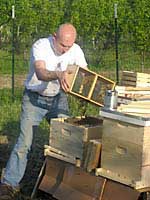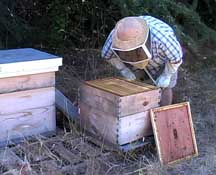How Do I Love Bee?
- By Heidi Lewis
- Reading Time: 3 mins.
Farmer-Beekeepers Count the Ways
Honey from bees is quite the miracle. Why does it taste so good? And why does it have so many healing properties? Many scientists have studied the organization of beehives and the behavior of bees, but it is philosophers such as Rudolf Steiner who give us a clue to the answer: love.

“The whole beehive is permeated with life based on love. In many ways the bees renounce love, and thereby this love develops within the entire beehive,” Steiner said in a series of lectures on bees in the 1920s. “But the thing that a bee profits from the most is that it derives its sustenance from the very parts of a plant that are pervaded by the plant’s love life. The bee sucks its nourishment, which it makes into honey, from the parts of a plant that are steeped in love life. And the bee, if you could express it this way, brings love life from the flowers into the beehive.”
 If you know any beekeepers, you may have observed how they love their bees. Two great examples are Katia and Doug Vincent of Beekind Beekeeping and Honey store in Sebastopol CA (Sonoma County). They seem to be imbued with the energy of their bees as well. They are tireless in their work to inform and preserve beekeeping as well as run their store, which offers a selection of products all made from bees’ industry, as well as beekeeping classes. The Vincents are mentoring Asian pear farmer Torrey Olson of Gabriel Farm on his bees. Back in early 2009, The FruitGuys Farm Steward Program (now The FruitGuys Community Fund) sponsored the installation of four hives on Torrey’s Farm. Despite a devastating setback last winter when half the hives were lost, the bees are back in business and have been dancing from Asian pear blossom to lavender sprig to produce some delectable honey that will be included in The FruitGuys’ October SlowFood Victory Garden Crate.
If you know any beekeepers, you may have observed how they love their bees. Two great examples are Katia and Doug Vincent of Beekind Beekeeping and Honey store in Sebastopol CA (Sonoma County). They seem to be imbued with the energy of their bees as well. They are tireless in their work to inform and preserve beekeeping as well as run their store, which offers a selection of products all made from bees’ industry, as well as beekeeping classes. The Vincents are mentoring Asian pear farmer Torrey Olson of Gabriel Farm on his bees. Back in early 2009, The FruitGuys Farm Steward Program (now The FruitGuys Community Fund) sponsored the installation of four hives on Torrey’s Farm. Despite a devastating setback last winter when half the hives were lost, the bees are back in business and have been dancing from Asian pear blossom to lavender sprig to produce some delectable honey that will be included in The FruitGuys’ October SlowFood Victory Garden Crate.
To produce one tablespoon of honey takes 2,000 flower visits and the life’s work of 36 bees. Bees make honey for the hive: honey fuels the workers, drones, queen attendants, comb builders, pollen packers, fanners, foragers, water carriers, guards, and nurse bees. Bee pollen is used to feed the brood and nurses produce royal jelly to feed the queen.
Want farm-fresh fruit?
We've got you covered.
Many athletes use bee pollen as a supplement a great nutritional boost. It is a complete protein that contains 22 amino acids and 59 trace minerals. You may want to check with your health care provider before trying it. Some people have reported allergies to bee pollen and nursing and women are cautioned against using it. When you open a hive’s pollen collector, you will find small colorful pebbles of pollen, the color comes from the different flowers. It is completely edible straight from the hive and you only need a little bit, maybe a teaspoon. Katia advises that you eat pollen with honey as honey aids its digestion, or mash it to a powder and add to a smoothie. Anyone who is allergic to bees or specific pollens should also consult their physician before imbibing bee products.
Royal Jelly is executive food. It is secreted from the head of the nurse bees to feed the queen to maintain her highly productive role. It is very precious to the hive and is collocated in special frames. It is a great immune booster and healing agent that is full of B vitamins, Pantothenic Acid, Biotin, and Folic acid.
 Plain everyday honey has amazing healing and protective qualities as well. Foremost honey is antibacterial. It contains an enzyme from the bees’ stomachs that produces hydrogen peroxide. That’s why it can be used to treat minor cuts and scrapes. Honey is hygroscopic, which means it attracts moisture, so it keeps things like skin moist. That’s why honey is an ingredient in many natural body care products. Honey is also full of antioxidants, with darker honey having a higher amount.
Plain everyday honey has amazing healing and protective qualities as well. Foremost honey is antibacterial. It contains an enzyme from the bees’ stomachs that produces hydrogen peroxide. That’s why it can be used to treat minor cuts and scrapes. Honey is hygroscopic, which means it attracts moisture, so it keeps things like skin moist. That’s why honey is an ingredient in many natural body care products. Honey is also full of antioxidants, with darker honey having a higher amount.
And, of course, it tastes delicious. Bees sup from the flowers closest to their hives, so an abundance of honey varietals are available nationwide. Flavors range from coast wildflowers and orange blossom to blackberry and buckwheat fields, and even pinecones.
Want farm-fresh fruit?
We've got you covered.
Anyone who is allergic to bees or specific pollens should also consult their physician before imbibing bee products.
– Heidi Lewis


